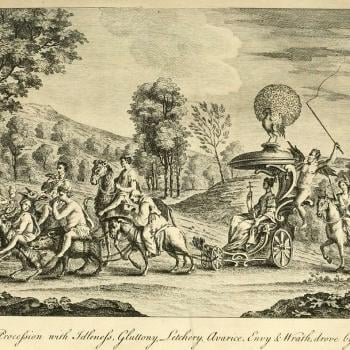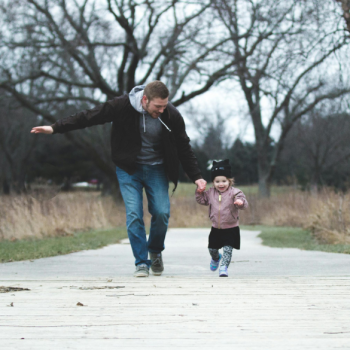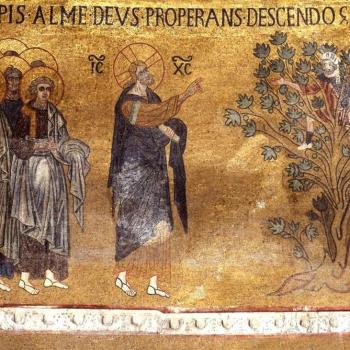Editors' Note: This article is part of the Patheos Public Square on Homeschooling and Public Education. Read other perspectives here.
Educational choices are among the most far-reaching and consequential decisions parents will make for their children. "The direction in which education starts a man [or woman] will determine his future life," wrote the ancient philosopher, Plato. Much is at stake for your child's future in these decisions, and to make matters worse, views on education are frequently emotionally and ideologically charged.
One of the most hotly debated topics within education is that of homeschooling, particularly when set in contrast with America's public school system. Share with a stranger about educating your children at home instead of sending them to your local public school, and you will soon find that strong opinions quickly come to the fore and emotions run high. Yet efforts to understand the influences of faith upon one's approach to education require deeper digging and often defy stereotypes.
My own story may help those who attempt to wade through these murky waters. I was homeschooled from third grade through twelfth grade, following a brief stint at a private school. My parents (primarily my mother during the average "school day") taught my three younger siblings and me to love learning, to love people, and to love God. They cultivated our young imaginations and discouraged fearful isolationism. My parents made their decision based on a variety of factors, including availability of quality alternatives, cost, faith convictions, and availability of nearby homeschooling resources.
For homeschoolers on the more radical ideological spectrum, however, homeschooling is often not a choice—it is a requirement. Some ultra right-wing homeschoolers who also identify as Christians fall within this camp as well, believing that the Bible mandates homeschooling. This view is usually based on imprecise interpretations of passages like Deuteronomy 6:5-9. Parents who put their children in the public school system are sinning, in this view, by disobeying a divine mandate. Associated with this perspective is the idea that we ought to fear the indoctrination of the so-called "godless" public schools, whether it manifests itself in the form of atheist teachers and administrators, or of secular curriculum.
In my case, the fact that my parents chose to educate me at home provided opportunities that otherwise may not have been available to me. The public elementary school I might otherwise have attended in urban northern-New Jersey ranked in the lower 25th percentile, state-wide. For my parents, religious concerns certainly were a factor; they wanted us to have an educational context where the Bible could be taught. However, quality of education and academic concerns were also critical for my mother and father, both of whom had by then obtained master's degrees. My mom was also a certified teacher. So, after weighing the options together, my parents decided to try homeschooling.
We joined several co-operative groups of homeschooling families, which allowed for sharing resources and expertise. A retired public school physics teacher taught us physics and chemistry when it came time for high-school level course-work. A local doctor taught Latin. Several moms with advanced English degrees taught the writing and literature courses. And, like most homeschoolers, I read and studied a great deal on my own. Some days were spent at home all day. Other days, my mother chauffeured us from art class to community Bible study youth groups to piano and voice lessons. Each day had its scheduled rhythm. In the high school grade levels, I became more and more interested in music, spending one entire day per week with a local music program for homeschoolers, participating in various choirs, several of which traveled around the country for competitions against public and private schools and bringing home the gold medals on many occasions.
My educational experience was no cloistered life of seclusion and fear. Even within the homeschooling community (at least in the greater NYC metropolitan area where we lived), diversity abounded. The four hundred families that made up the regional homeschooling association ranged from poor to wealthy, African-American and Asian-American to Caucasian and Hispanic, various flavors of Christianity to families and individuals of other faiths, or of none. I learned the importance of the freedom of religious exercise and expression, and the enormous value of the diversity surrounding us in this pluralist society, as we work through and embrace our own core beliefs and values.
Is homeschooling a choice of opportunity? Yes, for those who cultivate such opportunities, homeschooling is a boon for society. Is homeschooling a choice of fear? Yes, for some. Yet those who choose homeschooling through fear are subsequently controlled by their fears, often resulting in judgmental attitudes and actions toward all who choose a different path from themselves. Are there dangers in the public school system? Certainly, but it is important to remember that each public school and district can vary drastically. As a parent it is your responsibility to know what you are getting you and your children into and to take any necessary action. Follow Mark Twain's example from his famous quip: "I have never let my schooling interfere with my education." Whether your choice, or the options available to you for various reasons, result in public school, private school, or homeschooling, make sure that you as parents, along with any other teachers and the child herself, focus on values, character, and the heart—and not as much on whether your child is sitting at your kitchen table or, alternately, a well-worn local school desk. Education is happening at every moment, regardless of the setting in which it occurs.
9/7/2016 4:00:00 AM




